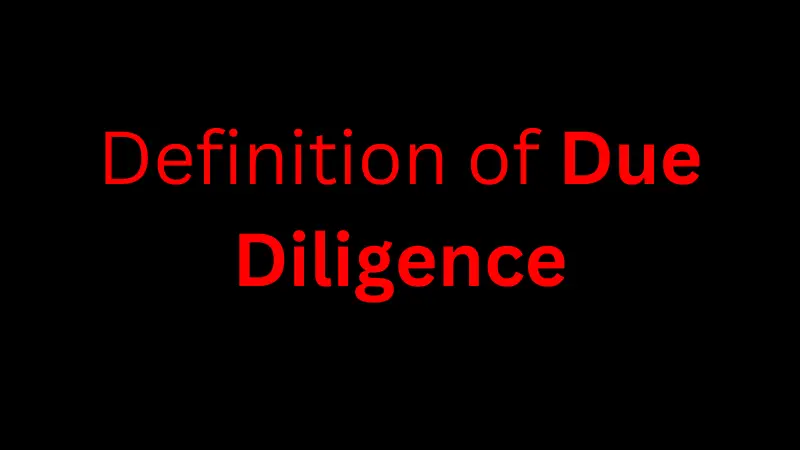Definition of Due Diligence

When conducting business transactions, the term “due diligence” is often used to describe the process of investigating and verifying information related to potential investment or acquisition. Due diligence is an essential part of any business deal, as it helps to identify and mitigate potential risks and provides a clear understanding of the value of the investment.
Below we will discuss the definition of due diligence and the different types of due diligence that can be conducted in various business contexts.
What is Due Diligence?
Due diligence is a comprehensive process of investigation and analysis that is conducted by businesses or individuals when considering an investment or acquisition. The process is designed to gather information and assess the risks and opportunities associated with the investment, including legal, financial, and operational considerations.
In general, due diligence involves a thorough review of all relevant documents and records, including financial statements, contracts, legal agreements, and other important documents. The purpose of this review is to identify any potential issues or risks that may impact the value of the investment or the success of the transaction.
The process of due diligence typically involves a team of professionals, including lawyers, accountants, and other subject matter experts who can provide specialized knowledge and insights. The team will review and analyze all available information and provide a report detailing their findings and recommendations.
Types of Due Diligence
There are several types of due diligence that can be conducted depending on the nature of the investment or acquisition. Some of the most common types of due diligence include:
Financial Due Diligence
Financial due diligence is focused on assessing the financial health of the business being acquired or invested in. This type of due diligence involves a review of financial statements, tax records, and other financial information to assess the company’s profitability, cash flow, and financial stability.
Legal Due Diligence
Legal due diligence is focused on assessing the legal risks associated with the investment or acquisition. This type of due diligence involves a review of contracts, agreements, regulatory compliance, and other legal issues to assess the potential for legal liability.
Operational Due Diligence
Operational due diligence is focused on assessing the operational risks associated with the investment or acquisition. This type of due diligence involves a review of the company’s operations, including its supply chain, manufacturing processes, and other operational considerations to assess the potential for operational inefficiencies or other issues that could impact the value of the investment.
Environmental Due Diligence
Environmental due diligence is focused on assessing the environmental risks associated with the investment or acquisition. This type of due diligence involves a review of the company’s environmental compliance, environmental impact, and potential environmental liabilities.
Technical Due Diligence
Technical due diligence is focused on assessing the technical risks associated with the investment or acquisition. This type of due diligence involves reviewing the company’s technology, including its software, hardware, and other technical assets, to assess the potential for technical issues or inefficiencies that could impact the value of the investment.
Benefits of Doing Due Diligence
Due diligence is an essential process for any business or individual considering an investment or acquisition. There are numerous benefits to conducting due diligence, which can help to mitigate risks, identify opportunities, and make informed decisions about the value of the investment. In this article, we will discuss the benefits of doing due diligence.
- Identifies Risks
One of the most significant benefits of doing due diligence is that it helps to identify potential risks associated with the investment or acquisition. By conducting a thorough review of all relevant information, including financial, legal, operational, environmental, and technical considerations, businesses can identify potential issues that could impact the value of the investment. This allows businesses to take steps to mitigate risks and ensure that they are making sound investment decisions.
- Provides Valuable Insights
Another benefit of doing due diligence is that it provides valuable insights into the business being acquired or invested in. By reviewing financial statements, contracts, legal agreements, and other important documents, businesses can gain a clear understanding of the company’s operations, financial health, and potential for growth. This information can be used to make informed decisions about the value of the investment and the potential for future success.
- Enhances Negotiations
Conducting due diligence can also enhance the negotiation process. By identifying potential risks and opportunities, businesses can use this information to negotiate better terms for the investment or acquisition. For example, if there are significant legal or financial risks associated with the investment, businesses can negotiate for more favorable terms or contingencies to mitigate those risks.
- Helps to Build Trust
Conducting due diligence can also help to build trust between the parties involved in the transaction. By demonstrating a commitment to transparency and a thorough review of all relevant information, businesses can build trust with potential investors or acquisition targets. This can be especially important in situations where there may be a high level of risk associated with the investment.
- Prevents Future Legal Issues
By conducting legal due diligence, businesses can identify potential legal issues that could arise from the investment or acquisition. This includes identifying any existing legal liabilities, compliance issues, or contractual obligations that could impact the transaction. By identifying these issues early on, businesses can take steps to prevent future legal issues and ensure that they are making sound investment decisions.
- Reduces Costs
Finally, conducting due diligence can help to reduce costs associated with the investment or acquisition. By identifying potential risks and issues early on, businesses can take steps to mitigate those risks, which can ultimately lead to cost savings. Additionally, by negotiating better terms and contingencies, businesses can ensure that they are getting the best possible value for their investment.
Conclusion
Due diligence is an essential process that is used to investigate and analyze the risks and opportunities associated with a potential investment or acquisition. The process involves a comprehensive review of all relevant information, including financial, legal, operational, environmental, and technical considerations.
By conducting due diligence, businesses can identify and mitigate potential risks and make informed decisions about the value of the investment. Whether you are considering an investment or acquisition, it is essential to conduct due diligence to ensure that making a sound business decision.


